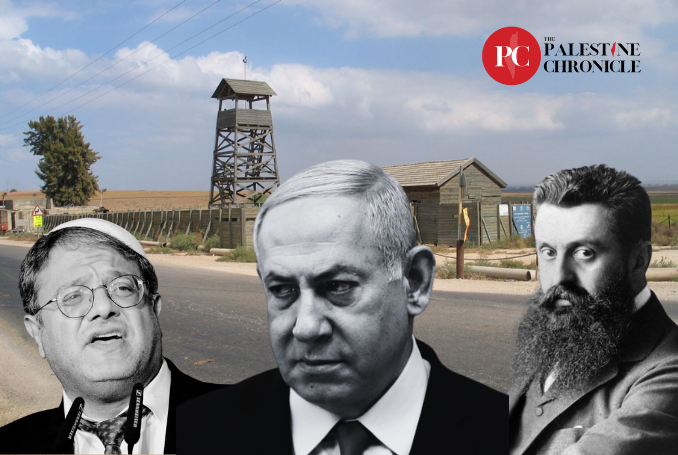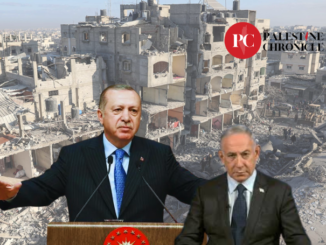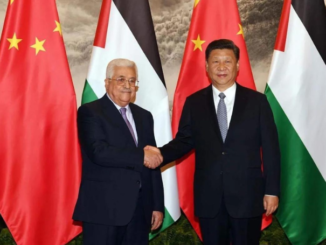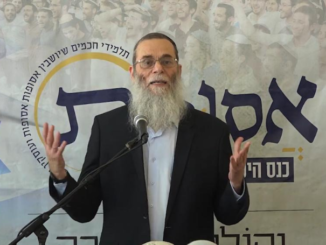
By Blake Alcott
Colonized have been fighting colonizers for millennia. Not because the colonizers were Christian Crusaders or Moslem Tatars, or Buddhists, or French, Belgian, British or German, but rather because of what colonizing is: collective slavery.
When a Palestinian resistance fighter shoots an Israeli soldier, who is he actually shooting? By all evidence, he is not shooting a Jew because he or she is a Jew, but because he or she is a colonial occupier.
The Palestinian resistance has always – yes: ever since the years of the British Mandate – said it is fighting colonial occupiers whose race and religion don’t matter. I believe them, the more so as there is no history of anti-Jewishness in the Arab world.
The PLO cannot have had anything against Jews as Jews – that is, because they were Jews – seeing as Article 6 of its Charter included indigenous Jews in its definition of ‘Palestinians’.
Towards the middle of the British occupation, the Palestinian leadership increasingly said they would accept as Palestinians those Jewish immigrants who had become Palestinian citizens under Mandate law – despite the fact that they’d come to Palestine in order to take it over. Again and again they stressed that it was Zionist immigration they were against, not necessarily Jewish immigration.
So by the correct definition of ‘antisemitism,’ the Palestinians have never been antisemites. But more: neither Jews as Jews, nor Zionism, have anything to do with the core of Palestinians’ liberation problem, which is simply that they are colonized, by whomsoever.
My choice for Article of the Year 2023 appeared in Mondoweiss on 26 September, written by Mohammed El-Kurd with the title: “Jewish settlers stole my house. It’s not my fault they’re Jewish.”
It’s Political, Not Ethnic
Colonized have been fighting colonizers for millennia. Not because the colonizers were Christian Crusaders or Moslem Tatars, or Buddhists, or French, Belgian, British or German, but rather because of what colonizing is: collective slavery.
The ethnicity (or ‘race’ – in this article they are synonymous) and religion of the colonial occupier of Palestine is thus incidental in the Palestinians’ freedom fight. From 1918 until 1948 the colonial power was Christian Britain. It could have been anybody. Now the occupiers insist on calling their colonial state ‘Jewish’. But as Mohammed El-Kurd wrote, that’s their business.
Zionists are a mixture of Israelis, Western politicians, and the apologists for racist-colonialism in the Western press, from the Washington Post all the way down to Zürich’s Tages-Anzeiger. It is these Zionists who unrelentingly commit the intellectual crime of conflating Israel’s nature as colonizer and its self-bestowed nature as Jewish. They assault our brains daily with the literally untrue equation of Zionism and Jewishness, always underlining the ethnicity or religion of the Israeli majority rather than its role as oppressor since 1948.
If they instead wrote that up to 1200 occupying settlers and soldiers had been killed on October 7, 2023, the current battle would finally be accurately described: it’s political. For the Israelis, to be sure, it is also racial and religious, but not for the Palestinians. As Hamas wrote in its Document of General Principles & Policies in 2017,
Hamas does not wage a struggle against the Jews because they are Jewish but wages a struggle against the Zionists who occupy Palestine. Yet, it is the Zionists who constantly identify Judaism and the Jews with their own colonial project and illegal entity.
The lesson for those of us in Palestine solidarity is that we should never speak or write of the ‘Jewish state’, only of ‘Israel’ or the ‘colonial state’ or maybe the ‘Zionist entity’ or, following common Arabic-language usage, simply ‘the occupation’.
A Little History
When freed from Ottoman rule the Palestinians – the people in the southern part of al-Sham – were thirsting for simple independence. In the terms of Article 22 of the Covenant of the League of Nations, they wanted to “stand on their own”.
Nobody denies that the role of colonizer passed from the Ottomans to the British just after World War I. The British ran Palestine for thirty years out of their Colonial Office in London. Rule was shaped and enforced by bureaucrats and soldiers from a big island northwest of France, not by indigenous Palestinians. The more so as the League of Nations exercised no control over its ‘mandated’ territories, whoever wants to deny that ‘Mandate’ was a mere euphemism for ‘colony’ should step forward.
But as of 1948, when it comes to Israel, confusion takes over. It and its apologists burn the midnight oil trying to show that Israel is not a (settler-)colony, although the facts make their job very tough.
A few facts: The Jewish Colonization Association was founded already in 1891 to help settle European Jews in Palestine. The Jewish Colonial Trust was a bank formed in London in 1899 for similar purposes. The Articles describing Britain’s task as ‘Mandatory’ literally included the 1917 Balfour Declaration’s pledge to establish (alas, in Palestine) a “national home for the Jewish people” and furthermore specified as the main colonization tool a “Jewish agency” which would “facilitate Jewish immigration” “encourage the close settlement of Jews on the land” and “facilitate the acquisition of Palestinian citizenship by Jews”.
That is, the mechanics of British and Jewish-Zionist colonization were never separate. Governor of Jerusalem Ronald Storrs called the British entity in Palestine the “Zionist Mandate” – a Zionist colony. The European immigrants routinely described their new settlements as ‘colonies’. And their use of the word ‘return’ to describe their movement from Europe into Palestine was an acknowledgment that in the real-life twentieth century, they were coming from somewhere else.
In 1921, Palestinian anti-Zionist Mohamed Osman flabbergastedly wrote to Colonial Secretary Churchill that “we have never heard of a country being given wholesale to a people who have never seen it or whose fathers never lived in it.” In 1930 Awni Abdul Hadi rhetorically asked a League of Nations commission, “How can these British politicians make promises in a land they don’t own to a group of foreigners in a country that is not theirs either?” He repeated this sentiment to David Gruen’s face in 1934. These were the first indigenous conceptualizations of settler-colonialism.
Repeated ‘Legislative Councils’ floated by Britain foresaw a majority of seats for supporters of the colonization project. The Cabinet Committee on Palestine in 1939, fed up with the ruinous cost of the Great Revolt as well as the Mandate in general, discussed “handing over a whole colony to the Jews” for their state – e.g. British Guiana or Honduras. And George Antonius in 1940 wrote that the ‘Jewish national home’, hitherto non-existent, could logically only denote a colony.
Except for a handful, the actual Zionists who were forced upon Palestine before 1948 came from Europe or the Americas, and by 1948 they were over 500,000 strong and together with the Arab Jews made up 32% of Palestine’s population.
The Declaration of the Establishment (not ‘Independence’) of Israel was signed by 37 people. One was born in Palestine, one in Yemen, and 35 in Eastern Europe. If this is not the establishment of a European colony, what is?
Usurpation of Political Land
The rest of the colonies established just after the First World War – Lebanon, Syria, Iraq, Jordan, Saudi Arabia, Egypt – got their independence. Only Palestine remained and remains colonized. Britain had done its job in passing the baton on to Israel, the state it had enabled.
Today’s Israelis thus in fact exercise colonial power, and therefore we have a perfectly adequate non-racial, non-religious vocabulary with which to describe the colonized’s battle. When for instance we talk of the attack on the Zionist state on October 7, referring to that state’s self-defined Jewishness can take the back seat.
In terms of actual land area taken into military control, by the end of 1948 about 78% of Palestine had been robbed and squatted on by settlers. UN General Assembly Resolution 181 had recommended the new ethno-state’s colonization of 56% of Palestine, but guns and violence secured roughly another 22%. (And since Jordan and Egypt took the rest, all of Palestine had then been politically usurped – colonized.)
We know the details of the ethnic cleansing on the basis of non-Jewishness. The result was that today at least two-thirds of Palestinians are displaced. They live under appalling injustice, both historical and current. Like all violated people they do and will fight back, whatever the race or religion of the wrong-doers. Similarly, in Hollywood movies the landowner stands on his porch with his shotgun, telling the trespassers ‘Get off my land!’ without asking after the race or religion of the trespassers.
This is not to deny that many Palestinians are motivated not only by their vision of liberation but also by their religion, whether Christianity or Islam. The Al-Aqsa Flood is aptly named. But the topic of Islamism in the freedom fight goes way beyond the scope of this article.
Race and Religion are Weapons
Racism and religious bias are extremely frowned upon in the pages of public opinion, and of course, Jews as Jews were horribly destroyed in Europe pre-1948. So the anti-Palestinians can only profit if public opinion sees the freedom fight in racial and religious terms.
Britain laid the groundwork for ‘religionizing’ Palestine. In the Balfour Declaration it set up two groups – “Jews” and “non-Jews” – and later invented a ‘Supreme Moslem Council’. It furthermore reserved Legislative Council seats for Christians, Jews and Moslems separately.
It is seldom remarked that it is only the Israeli side that defines its groupness in ethno-religious terms. The Palestinians have always included all of the three above-named religions in their group, defining themselves only in terms of place, language and culture. Even the Islamic Resistance Movement Hamas primarily defines itself, not Palestine, as Islamic, and has never denied that Druze, Christians and Jews are ‘Palestinians’.
Thus, any talk of two ‘sides’, and especially of two ‘peoples’, is false. At best it is comparing apples and pears, while at worst it unfairly ethnicizes the Palestinian polity.
But mainly, without this ethno-religious framing the antisemitism weapon falls from the Zionists’ hands. This weapon is now powerful even if, due to its inherent nonsensicality, its days are numbered. It has convinced hundreds of millions of voters in the pro-Zionist Western countries.
The ongoing genocide, to be sure, is a matter of race and religion, but only because the perpetrators want it that way. It is they who brutally discriminate in terms of ethnicity.
We need to start right now boycotting the premise that the struggle is between two religions or ‘peoples’, and use only its accurate description as an anti-colonial fight. You fight to get your physical and political land back, whoever took it. You resist Israelis who are Jews, but not because they are Jews. There is no need to especially ponder the Jewishness of colonial power Israel.
Fourteen million Palestinians will get their homeland back. That will be easier if the Palestinian cause can be politically explained to people in countries full of Zionist apologists – people who could remove their current leaders. I think that we can do this job more effectively if we realize that this is not about Jews. Jewish Israelis come into the picture only because as a matter of historical accident they are the occupiers. It’s not even about Zionism. It’s about Palestinians.

– Blake Alcott is a retired cabinetmaker and ecological economist who has been a solidarity activist since 2010, now living in Zürich. He is Director of ODS in Palestine (UK), an NGO working to make One Democratic State more understandable to the public. His 2023 book, The Rape of Palestine: A Mandate Chronology, consists of 490 instances of the dialogue, such as it was, between the British and the Palestinians during the years 1917-1948. He contributed this article to The Palestine Chronicle








Nailed it!